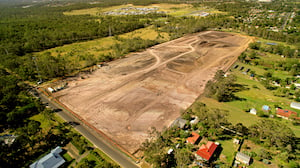CRE Development Mistakes - How to Find the Right Civil Engineer For Your Project
Your choice of a civil engineer plays a vital role in the success of a real estate development project. And hiring the wrong engineer can lead to project delays, increased costs, and of course, more headaches.
In this video, we discuss the importance of finding the right civil engineer, but importantly, the 4 key considerations you should weigh when making the decision. This video is part of our series 'CRE Development Mistakes' - helping investors, developers, and businesses avoid costly mistakes during the real estate development process we've made in the past.
Guide to the video
- A civil engineer is critical to success during the site selection and pre-development phases of a project
- Some engineers have their own unique expertise within the field of civil engineering - land planning, design, zoning regulations, etc.
- A well-connected civil engineer can give you access to key decision-makers and approval authorities
- Failure to budget for site work and development costs early can derail a project later
Video transcript follows
Hey everyone – It’s Matt Marsh, founder of Marsh & Partners.
Marsh & Partners is a Raleigh-based development and national consulting firm that helps business owners and investors maximize their real estate and transform their businesses.
----------
In this video, I wanted to cover a topic that’s critical to the success of a real estate development project – and that’s finding and hiring the right civil engineer for the job.
Unforeseen challenges are a reality of any development venture. But the ability to identify those surprises early and figure them into your purchase price or development budget is often the difference between a profitable project or a money pit. And if you allow yourself enough due diligence time on the front end of a project, you can manage your risk even further.
A civil engineer is an expert in all things site planning and design. During your project, they’ll help you navigate municipal development and design ordinances, assess topographic and terrain feature site constraints, and take the lead on ushering your site plan and project through the proper government approval authorities.
But there are a lot of engineers out there. And understanding how critical it is to find the appropriate engineer early, the important question is, how do you go about hiring the right one?
There are 4 key factors to consider when finding the right civil engineer for your development project.
1. Identify your project goals
First, you need to identify your project goals because your goals will ultimately inform the site selection process – you need to determine what your project requirements are, and what type of property will meet your requirements. You don’t want to get yourself into a situation where you’re fully committed to a project and need to retroactively make a piece of land fit your needs.
But the site selection process is rarely ever straightforward. From determining the capacity of existing utility infrastructure to assessing potential off-site improvements to addressing zoning considerations - every site has its own unique characteristics, and there’s a lot consider. And your choice of a civil engineer will play a large role in determining the success of a project.
2. Assess an engineer's expertise & experience
The second key factor is assessing an engineer’s expertise and experience. Some engineers pride themselves on their land planning and design acumen. Others may focus on specific product types (multifamily vs. retail projects) or development types (infill vs. large greenfield subdivision projects).
The point is, you’ll want to consider an engineer’s experience, and properly match their skill set with your project. If you’re tackling a county residential subdivision, a civil engineer with large-scale planning and extensive design experience may be better suited to help you. If you’re undertaking a mixed-use planned urban development, or PUD, you’ll want to find an engineer who’s adept in navigating zoning and land-use regulations.
3. What political connections do they have?
The third consideration, and quite frankly a less savory side of the business you’ll want to weigh is an engineer’s political connections. I’d love to tell you that projects are approved based on their merit and the positive economic and social impacts to a town or neighborhood, but that’s often not the case.
Every municipality has its own quirks. Planning departments and elected officials are as fallible as folks in the private sector. And engineers who have experience dealing with local officials usually have a better pulse on what makes them tick and have a higher likelihood of success getting projects approved.
A well-connected engineer’s access to various departments like public works or the environmental department is also critical. There’s huge power in being able to pick up the phone and quickly get a solid answer on something that might have a material impact on a project.
4. Consider an engineer's soft skills
The last factor you’ll want to consider when hiring a civil engineer are their inherent personality traits. Skills like organization, creativity, and project management are all important characteristics you should assess.
Your project is inevitably going to face roadblocks. But having an engineer on your team that can get creative and tackle challenges without simply throwing money at the problem is a powerful asset.
And if you’re a developer, the last thing you’ll want to worry about is having to corral your civil engineer, especially when your juggling multiple projects and various other professional tradesmen.
An organized, diligent, and responsive civil engineer is critical to meeting municipal deadlines and shepherding a site through the entitlement process.
----------
Thanks for watching – if you enjoyed the video hit the like button and subscribe to our channel below, follow us on Instagram at marsh partners real estate and check out our site for more real estate insights at marsh-partners.com
Feel free to leave us a comment if there are any other topics you’re interested in or would like us to cover.
Don't forget to subscribe if you want more content like this and thanks again for watching.



